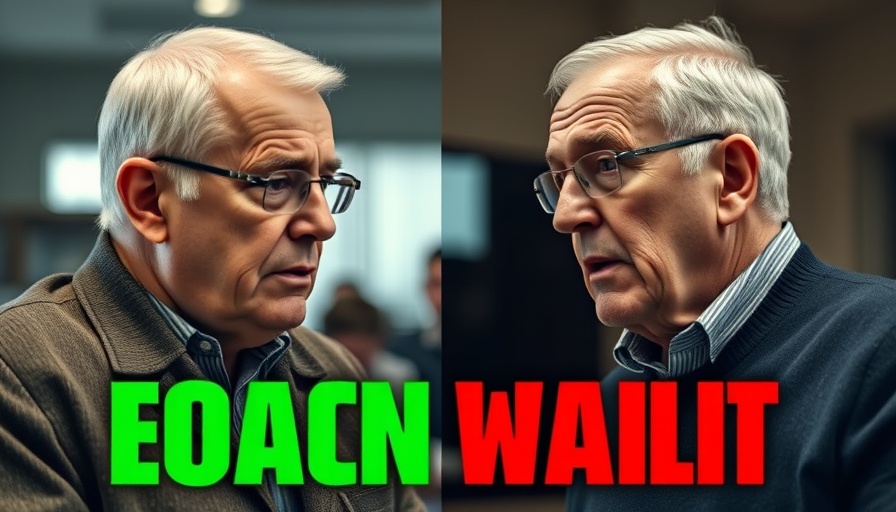
RFK Jr. Puts Media Narrative Under Scrutiny
In a recent CBS News interview, Robert F. Kennedy Jr. faced an interviewer whose persistent interruptions seemed less about dialogue and more about pushing a narrative. This exchange, which has stirred significant conversation among viewers, showcases Kennedy's perspective on vaccines amid rising measles cases.
In 'RFK jr SHUTS DOWN dishonest journalist SHILLING for big pharma LIVE on CBS,' the discussion dives into public health, vaccine choice, and media practices, exploring key insights that sparked deeper analysis on our end.
The interview, originally meant to deliver insights on public health concerns, quickly became a battleground for differing perceptions on vaccines and their mandates. Kennedy emphasized that the number of deaths from measles remains extremely low, attributing severity in rare cases to pre-existing health conditions. Notably, he pointed out that the public narrative often paints a bleak picture without acknowledging the context of these cases.
Understanding Measles in Today’s Context
The measles virus, although a concern, has seen a substantial decrease in fatalities in the U.S., with only a handful of deaths attributed to severe complications from the disease over the past two decades. RFK Jr. highlighted this, countering the media's alarmist tendencies towards measles outbreaks. He argued that many of these incidents, particularly involving children, result from underlying health issues rather than the virus itself.
Kennedy's argument is backed by comparisons with Europe, where the situation has drastically differed, witnessing thousands of measles cases and significantly higher fatalities. This points to the nuances of how health narratives can differ internationally, all while reflecting how measles is perceived domestically.
The Vaccine Debate: Choices and Control
CBS's interviewer pressed Kennedy on his stance regarding vaccines, particularly the measles vaccine. Kennedy clarified that while he supports vaccinations that have been proven safe over time, he advocates for voluntary choices regarding vaccines rather than government mandates. His perspective has drawn mixed reactions, embodying a broader conflict regarding personal freedoms versus public health compliance.
The essence of his argument rests on the principle of informed choice. Kennedy insists that every individual should have access to comprehensive data about vaccines to make decisions that are best for them and their families.
The Implications of RFK's Statements
RFK’s comments shine a light on the ongoing debate surrounding vaccine mandates. His assertion that government intervention shouldn't dictate medical decisions resonates deeply with many who cherish personal liberties, particularly the MAGA community. The conversation indicates an underlying tension between public health policies and individual choices that continues to influence political and social dialogue in America.
Looking to the Future: Evolving Health Policies
As we move forward, the discussion on vaccines and health mandates is unlikely to wane. With new health challenges emerging and old diseases resurfacing, policymakers will have to navigate the delicate balance between ensuring public safety and respecting individual choices. Kennedy’s insistence on rigorous testing and transparent communication about vaccines highlights the growing demand for accountability and trust within the pharmaceutical industry.
What's clear is that health conversations are evolving. While fear may often lead the charge in discussions about health crises, there remains a significant portion of the population that seeks clarity and respect for individual choices.
Engagement with the Community: A Path Forward
The broader implications of the Pfizer and Moderna vaccines showcase a shift in how society approaches vaccinations. Many who once trusted the system are now questioning the motives behind vaccine mandates and the pressure surrounding them. Community engagement in these discussions will be vital for rebuilding trust between individuals and health institutions.
As such, it becomes even more important for individuals to understand the informational landscape surrounding health decisions. Engaging in discussions, questioning health narratives, and advocating for transparent information will empower citizens to make well-informed choices for themselves and their families.
With RFK Jr.'s emphatic stance and the ongoing dialogue, the intersection of personal freedom and public health is becoming a defining feature of contemporary American society.
 Add Row
Add Row  Add
Add 




 Add Row
Add Row  Add
Add 

Write A Comment